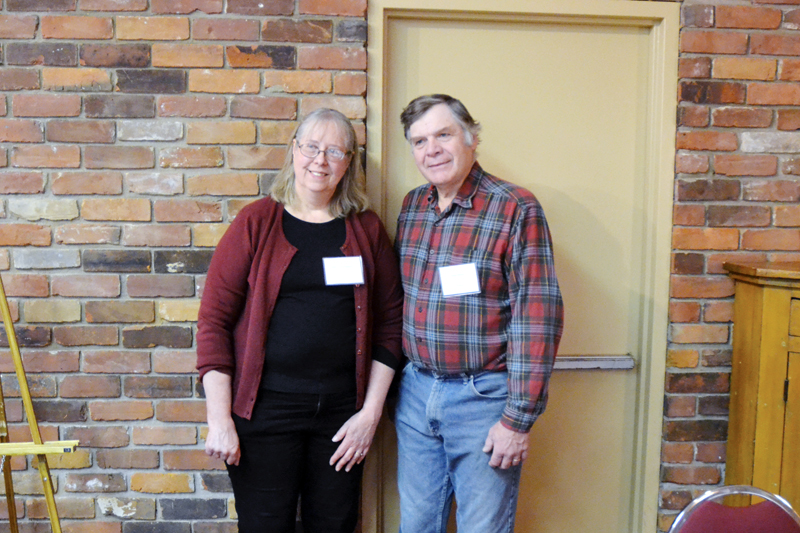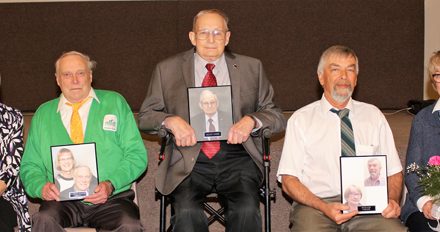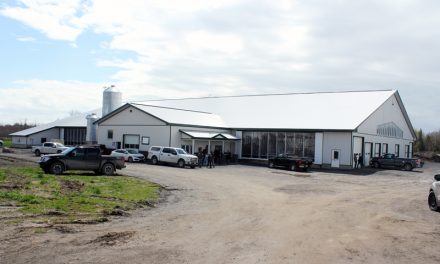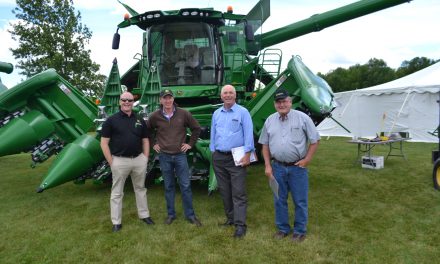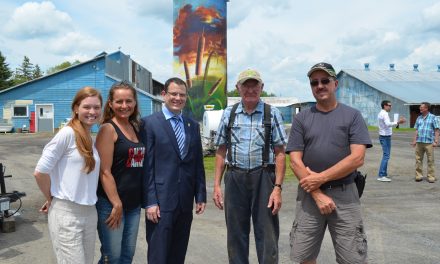Leading the way for organic grower communities
Mary-Howell and Klaas Martens owners and operators of Lakeview Organic Grain in the Finger Lakes region of New York, gave the keynote speech during the Eco Farm Days at the Ramada Inn in Cornwall on Sat., Feb. 24. The couple spoke about Farming for Resilience in a changing climate. The Martens started out with conventional farming but switched to organic and 20 years later they are a leader in their industry, have cultivated a community of organic growers and are the go-to farmers for advice about soil health and crop rotation. Sawyer Helmer photo
by Kalynn Sawyer Helmer
AgriNews Staff Writer
CORNWALL – Klaas and Mary-Howell Martens spoke to a packed room during the Eco Farm Day held at the Ramada Inn in Cornwall in late February. The couple, who own Lakeview Organic Grain and farm 1,600 acres, live and work in the Finger Lakes region of New York. The pair’s keynote speech was titled Resilient Farming in a Changing Climate and their experiences on the forefront of organic production had the audience captivated.
When Mary-Howell met her now husband Klaas, he was a conventional farmer and remained that way for a number of years. Over the last 20 plus years, the couple has foregone the conventional ways and moved to organic production. However, their work in organics was not confined to their own farm. The Martens have built a sustainable organic community that fosters the prosperity of all their local organic farms.
“The key to resilience is community,” the couple explained. Klaas remarked on the take-over mentality that he himself had when a young farmer. That the only way to grow and prosper was if your neighbour failed and you could take over. However his mentality has since changed. “We all do better, when we all do better.”
The community that the Martens have built came from a lot of trial and error on their own parts before being the founts of knowledge that are sought out regularly today. What they have discovered is that to be resilient, they must be as flexible and diverse as possible. “In organic farming we must proactively provide the tools so that we have a healthy soil, otherwise disease will occur,” they explained. “It’s not about what you buy, it’s about what you do and how you manage the farm.”
For the Martens, management has become a special cocktail of crops to give the soil everything it needs without the addition of chemicals or add-ons. “Soil is physical, chemical, biological. Soil health is the balance of all three and of those three, the greatest is the biological. We must tend to the microbes like the healthy livestock that they are. We have to feel they are as important to us as our cows, pigs and cats,” the Martens said.
They went on to explain that every soil issue that they have encountered has been able to be fixed by introducing a new species or a new group of species. “Agronomic issues are a symptom of imbalance. By breaking up plant families you rotate and control pathogens.” The couple told the audience that they have even found great success in planting crops like yellow mustard for roughly six to eight weeks to fumigate the soil.
Other techniques the couple has implemented include going green on the farm and flipping the narrative with their consumers and buyers. They told the audience that the mentality of farming is a system where the producer grows crop and then tries to convince their buyers that they want it. The Martens have changed that. They are asking what their buyers want and how much they are willing to pay for it. Using this method they can determine where their markets are and grow with the knowledge their buyers will get something they really want.
At the end of the day, the message was a simple one, that community is the foundation of resilience.

